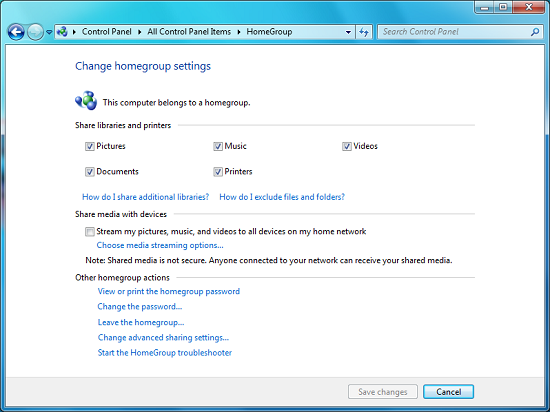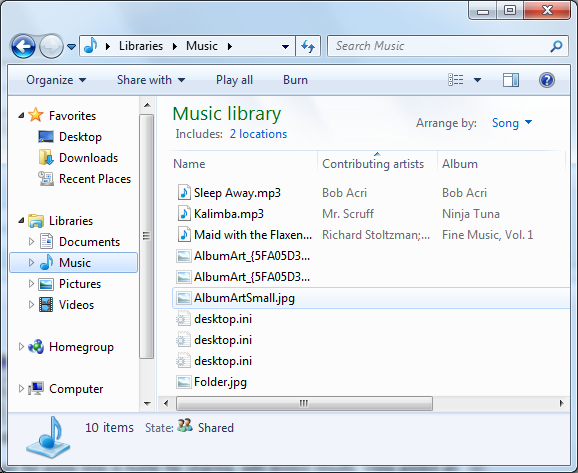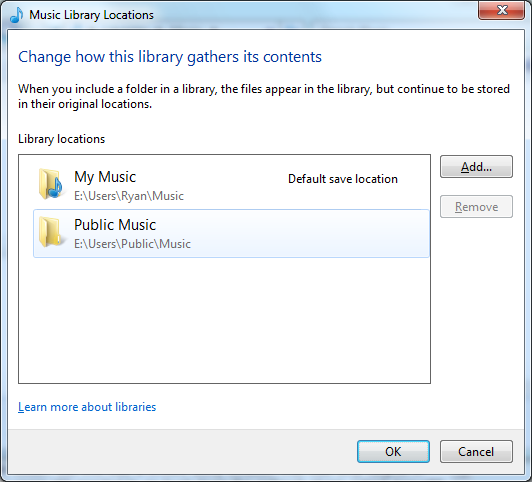Windows 7: Release Candidate 1 Preview
by Ryan Smith and Gary Key on May 5, 2009 11:00 PM EST- Posted in
- Systems
Libraries and Homegroups: New Ways to Organize and Share
Something Microsoft has been trying to conquer for some time is home file sharing, with limited results. Vista added an easy way to turn on network sharing of the Public folder, but this was a limited utility solution that was only helpful in sharing items specifically placed there, and other users still needed to go hunt down the network share (which brought plenty of problems of its own). Network shares are inherently a client-server design, while for home file sharing you need something closer to a peer-to-peer design.
With Windows 7 Microsoft appears to have finally gotten this right with the addition of two new features; Homegroups and Libraries. Homegroups are in essence auto-configuring network shares designed to act like a peer-to-peer network. When the first Windows 7 machine is added to a network, the user can choose to create a Homegroup along with what libraries they wish to share. Any libraries they choose to share will be opened up with read-only access to everyone else in the Homegroup, with Homegroup access limited by a shared alphanumeric password created along with the Homegroup.

Homegroup Configuration
Sitting on top of the Homegroup is the Windows 7 Libraries feature. Libraries in this case are a kind of meta-folder for various types of files, listing the contents of several different locations as if they were all in the same local folder. In turn Windows treats a library as a local folder and includes all the contents of a library in a regular search, or when browsing through files on Windows Media Player/Center, etc. Windows 7 comes with four libraries by default: Documents, Music, Videos, and Pictures. As there’s nothing special about a library other than where they search, any number of additional libraries may be created and shared.

Viewing the Music Library
The ultimate purpose for libraries is that they basically allow for the transparent integration of network shares, and this in turn is what makes Homegroups work. Once a computer has joined a Homegroup, its shared libraries become available as additional libraries, making the use of shared files largely transparent. In turn these remote libraries can be added to the local libraries, making the process fully transparent. Libraries can also be manually adjusted, allowing for files in other locations (local and remote) to be added to a library, although only local material is shared with a Homegroup. For the same reasons, this also solves the integration issues of Windows Home Server – Home Server shares can be added to a library, and made equally transparent.

Configuring A Library
It should also be noted that the meta-folder concept of libraries works in reverse too. Besides bringing together files from multiple locations, it’s a valid (and default) place to save files. In this case every library has a single defined “default save location” where all documents saved to that library actually get written to. By default, these locations are the regular folders inside of the user’s home directory.
In households with multiple computers, we’d expect that Homegroups turn out to be one of Windows 7’s most popular features given how easily we were able to set a group up and how well it worked in our testing. Libraries may be a hard sale however for users without multiple computers due to inertia, even if they’re still extremely useful for local-only use. We’ll have to see how this plays out.










121 Comments
View All Comments
ssj4Gogeta - Wednesday, May 6, 2009 - link
Exactly what SkullOne said. I also use Linux and know in what areas it's better than Windows. But I also know there are so many other areas in which it's a pain to use.SkullOne - Wednesday, May 6, 2009 - link
Spoken like a true jaded Linux fanboi. People like you are the reason Linux will never be mainstream. You think you're so high and mighty (or more secure) when you're not.Thanks for the laugh. I'd love for you to back up ANY of your comments with facts.
Disclaimer: I use Linux and Windows every day in production environments. They both have their place in the world.
snookie - Wednesday, May 6, 2009 - link
This blaming of Microsoft's Vista woes on Apple and a few commercials is just ridiculous. Most people pay no attention to such things those few that see them. It also has nothing to do with why Vista was a flop in the consumer space and an even bigger flop in the corporate marketplace. Certainly nothing to do with so many companies offering XP downgrades. Vista is a lousy product plain and simple and if there is any marketing fault it is Windows with their arcane multiple editions at ever increasing prices designed to milk customers. People aren't stupid even if they are computer novices. They know when they have been had, something is difficult to use, or not reliable. This is the result of years of piling layer upon layer of code on an ever expanding code base with no effort to start over and offer a clean efficient OS. The ONLY thing Windows 7 has over Vista is the interface is simplified and gets out of your way better. It can SEEM to run faster all it wants but test after test shows Windows 7 is barely faster than Vista at many tasks and in fact slower at some. Microsoft is in real trouble here because years of cruft code have left a huge amount of unusable code that consumes resources, adds instability, and provides entry to all sorts of malware. There is no way this codebase can be made to work efficiently with the quad and higher core procs that will be even more common in the next few years and what is Microsoft going to do then? They have three failed ad campaigns under their belt so their years of lying to their customers has fallen flat and corporate customers long ago stopped believing anything Microsoft said which is why open source that doesn't lock you in is becoming more and more prevalent. Microsoft has met the enemy and it is them.I notice you run Microsoft ads btw.
ssj4Gogeta - Wednesday, May 6, 2009 - link
I know so many people who haven't even TRIED Vista once and they keep telling other people how bad it is.formulav8 - Wednesday, May 6, 2009 - link
I agree almost 100%. I have customers who wants to make sure they have/get windows xp because vista is so bad. If you ask them why, they basically say its because a friend of a friends father said it was slow.I do know one of the biggest downfalls for Microsoft and Vista was allowing Intel to pressure them into getting Vista Certified compatability with those trashy integrated chipsets of Intel. So many users have those trash Intel xtreme/gma video chipsets and they had very bad Aero interface performance.
Anyways, I use both Vista and Windows7 daily. I like Vista better than XP overall and like Windows7 thus far compared to Vista.
I really think Windows7 will end up being one of the best oses made, even when compared to osx and windows xp.
Jason
vectorm12 - Wednesday, May 6, 2009 - link
Personally I never took to windows XP nor vista(had it been tecnologically possible I would still have been on WinNT 4.0), however as I bought a new PC I hit the RAM cap of 32bit XP Pro and therefore felt I had no decent choice than to move to 64bit Vista.My Vista experience has been far from great, reinstalls, crap drivers from nVidia and ATI not to mention a bunch of other third parties. However it hasn't been all bad, vista has quite a few ideas that just didn't work out just the way I would have liked.
Look at the save file dialogs for example where you actually had to click a button to browse directories other than the default one.
I've now been running on Win7 x64 since build 7k reinstalling almost every time a new version has been leaked and I'd say most of the things that bugged me with Vista has been corrected.
At this point the only thing I still want for Win7 is the "old" style control panel and an integration of the "administrator tools" into the control panel.
Looking at the big picture I say Win7 (even in BETA) is the best modern OS Microsoft has produced. The performance issues of Vista have been dealt with to a large degree. Drivers seem to work better and the most annoying GUI issues have been dealt with.
All Microsoft can do now to make me feel completely satisfied with my computing experience over the last few years is give me a BIG rebate on the upgrade to Windows7 from my old Vista licence.
johnsonx - Wednesday, May 6, 2009 - link
I just upgraded my XP-era Vista box (2.2ghz single core A64, 2GB RAM, VIA AGP mobo, X1950Pro) to Windows 7 tonight, and it was absolutely painless. It certainly seems faster than Vista, in particular I notice that my e-mail client and web browser launch and become ready much more quickly.I'm finding the new UI features to be actually useful as well, rather than Vista's pointless eye candy. I often have 6 or 7 browser tabs and several e-mail windows open, along with another couple of apps, and the new task bar makes it much easier to switch among them. I can see if I have any new e-mail just by moving the mouse over the client icon on the taskbar, no need to even click on it. Aero-Peek makes gadgets more usable too, since you can see them without minimizing every window. AeroSnap is great too. Only AeroShake defies explanation, but perhaps time will prove that one too.
I was never a Vista hater, though it certainly had it's frustrations. But it only took me 20 minutes with Windows 7 to never want to touch another Vista box again.
I was initially concerned that ATI's Windows 7 driver only supports cards back to the HD2000 series (presumably because the WDDM 1.1 driver model requires DX10 class hardware, which my X1950Pro is not), but the MS provided driver had no problems with Half-Life 2 (the only game I happen to have installed on this box) or any of the fancy GUI features.
The only weirdness so far as that at last boot up Windows told me a driver for Trend Micro Internet Security was being blocked due to a compatibility problem with Windows 7. That's understandable, except for the fact that I don't have any Trend Micro product installed, nor has one ever been installed in the past. It wouldn't tell me exactly what driver it was complaining about though, so I can't investigate further (I suspect some log somewhere will tell me exactly what driver it blocked).
One taskbar UI incontinuity: so much now works by simply moving the mouse over the various items, it suddenly seems odd to have to actually click on the start menu to get it to open.
johnsonx - Wednesday, May 6, 2009 - link
ok, it turns out the offending driver was TMCOMM.SYS, and it really was from Trend Micro. I have a vague recollection of running an online scan once a couple years ago (trying to scan a friend's external drive), so I guess it was trend micro and it left that driver around.As with most such things, the blocking event was neatly logged in the system event log.
thebeastie - Wednesday, May 6, 2009 - link
Wow, this new OS looks like Vista but with all the latest patches,IE8 and DirectX11. Then just a few cosmetic graphics changes.I AM EXCITED!
Come on what else did you expect? Maybe its something that has stuck deep in side people since they were kids around new PCs but when it comes to Microsoft new OSes people are just getting more and more nieve.
thebeastie - Wednesday, May 6, 2009 - link
More tests appear to be slower in Windows 7 then Vista etc.Things like reltek sound performance can be put to just as much to the 3rd party drivers then anything else.
I can't believe how many people I have talked to that use but hate Vista and expect Windows server to be light on its feet as XP but with the features of Vista, they are behaving as its something they could bet their life on.
What does it take for people to get some some technical intuition?
I mean thats what people really really really need here.